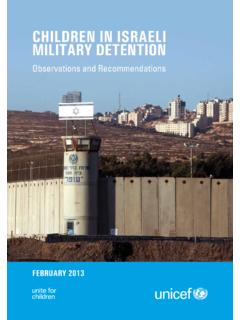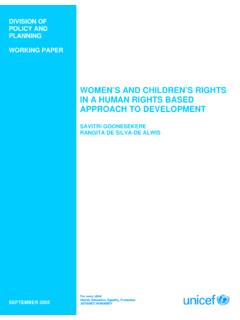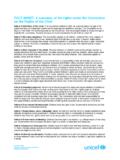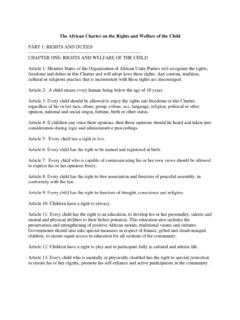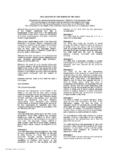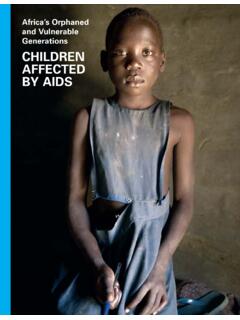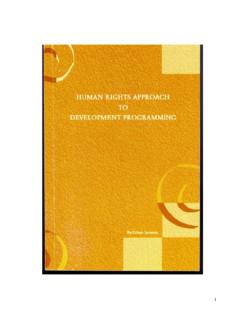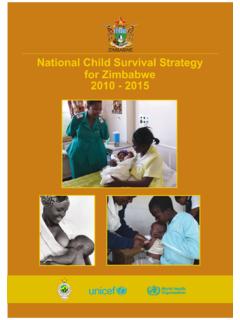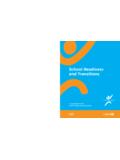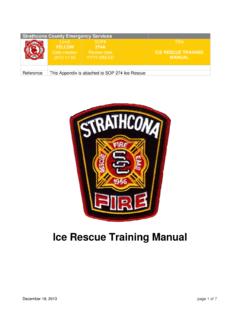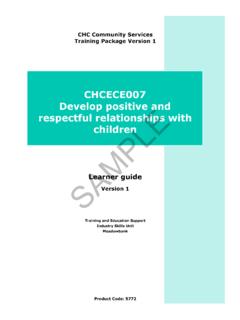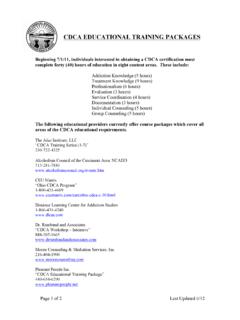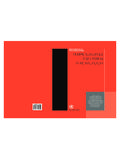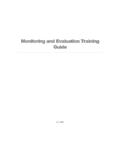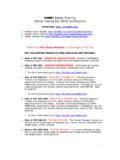Transcription of PARENTAL/PRIMARY CAREGIVER CAPACITY BUILDING …
1 EVERYCHILDHASTHERIGHTTOTHEBESTPOSSIBLEST ARTINLIFEEVERYCHILDHASTHERIGPARENTAL/PRI MARY CAREGIVER CAPACITY BUILDING training PACKAGE Not for public circulation without permission of the Department of Social Development Copyright 2008 Developed by the Department of Social Development in collaboration with UNICEFD epartment of Social DevelopmentPrivate Bag X 901 Pretoria0001 ECD contacts: Ms Tshidi Maaga or Ms Louise ErasmusEmail: or UNICEFPO Box 4884 Pretoria0001 ECD contact: Mr Andr Viviers Telephone: 012-3548201 Email: This document may be freely reviewed, abstracted, reproduced and translated, in part or in whole, but is neither for sale nor for use in conjunction with commercial management and layout: Handmade Communications and art direction: Michelle DiamondEditor: Liz HainesPARENTAL/ primary CAREGIVER CAPACITY BUILDING training PACKAGEdNATIONAL PARENTING PROGRAMMECONTENTSEXECUTIVE SUMMARY 2 List of acronyms, abbreviations and definitions 11 Annexure A: Essential skills for trainers of parents 12 Annexure B: Attendance list 18 SESSION 1: COURSE OUTLINE 21 Handout 1: Course outline 30 Handout 2: Children s rights and responsibilities 31 Background document: Children s rights 32 Background document: Young children with disabilities 33 Recommended organisations and service providers 37 Recommended reading on young children with disabilities 37 SESSION 2: HEALTH AND NUTRITION 39 Handout 3: IMCI Family Booklet for Child Health 48 Annexure A: Five nutrition message cards 49 Annexure B: Eight health message cards 50 Annexure C: Immunisation schedule 51 Annexure D: Case study on HIV and AIDS and feeding issues 52 Background information.
2 Health and nutrition 54 Reference list 60 SESSION 3: PLAY AND CREATIVITY 63 Handout 4: Play and creativity 71 Background document 72 Reference list 79 SESSION 4: PHYSICAL DEVELOPMENT 81 Handout 5: Physical development of babies and young children 89 Background document 90 Reference list 97 SESSION 5: SOCIAL DEVELOPMENT, EMOTIONAL DEVELOPMENT AND CONFIDENCE BUILDING 99 Annexure A: Milestone cards 107 Handout 6: Social and emotional development and confidence BUILDING 109 Background document 110 Reference list 118 CONTENTS1 NATIONAL PARENTING PROGRAMMEINTRODUCTIONCONTENTSSESSION 6: INTELLECTUAL AND LANGUAGE STIMULATION 121 Handout 7: Intellectual and language stimulation 129 Annexure A: CAPACITY to communicate 130 Background document: intellectual and language stimulation 133 Reference list 141 SESSION 7: CHILD SAFETY AND PROTECTION 143 Handout 8: Child safety and protection 150 Handout 9: Universal precautions 151 Background document 152 Reference list 158 SESSION 8: HEALTHY FAMILY RELATIONSHIPS 161 Handout 10: Healthy family relationships 167 Background document 168 Reference list 174 SESSION 9: POSITIVE DISCIPLINE 177 Annexure A: Four situations 185 Background document 191 Reference list 196 Handout 11: The differences between discipline and punishment 188 Handout 12: Points to remember 189 Handout 13: Discipline and punishment activity 190 SESSION 10: GRIEF AND BEREAVEMENT 199 Handout 14: Grief and bereavement 206 Background document 207 SESSION 11: ME, THE PARENT/ CAREGIVER 213 Handout 15.
3 Me, the parent/ CAREGIVER 218 Background document 2192 NATIONAL PARENTING PROGRAMMEEXECUTIVE SUMMARYThis training package was developed to enable trainers to train parents/ caregivers who take care of babies and young children from birth to five years old. It is acknowledged that parents/ caregivers possess a wealth of experience, knowledge and skills and the training programme uses this as the starting point. New ideas will also be shared with the participants. Trainers of this programme should be familiar with adult learning principles, have completed the Train the Trainers workshop and should be in possession of a NQF 4 or equivalent qualification at least. Trainers should preferably have a solid knowledge of all the resources in the community where the training is conducted. The training package consists of 11 sessions. The topics focus on essential skills, knowledge and attitudes that are important in raising babies and young children up to five years following topics are covered: Health and nutrition Play and creativity Physical development Social development, emotional development and confidence BUILDING Intellectual and language stimulation Child safety and protection Healthy family relationships Positive discipline Grief and bereavement Me, the parent/caregiverEach session of the training package consists of the following components: A training manual to direct the training Background document(s) containing important information that serves as the foundation for the training manual Handout(s) for participants as reminders of specific sessions Various annexures that support the training manual A list of references A PowerPoint presentation to conclude each session.
4 If a multimedia projector is not available, an overhead projector or alternative can be of this programme should be familiar with adult learning principles, have completed the Train the Trainers workshop and should be in possession of a NQF 4 or equivalent qualification at least. 3 NATIONAL PARENTING PROGRAMMEINTRODUCTIONThe training package is designed in a flexible way, sessions can be trained in a time block or the training can be spread over a few weeks during which one session per week is trained, for example. Each session will take more or less three hours to complete. The programme was tested in different settings before it was finalised. The results of the programme evaluation were incorporated into the final version of the training package. The training package provides the bridge or link between the Community Component of the Integrated Management of Childhood Illness Strategy (IMCI) and the Key Family Practices (KFP) as published and promoted by the Department of Health.
5 The Key Family Practices are included in this training training material is developed in English and it is recognised that this will pose particular challenges in a country such as South Africa which has such a rich linguistic diversity. Until the time when this manual is translated, trainers should adapt the training material to local training package provides the bridge or link between the Community Component of the Integrated Management of Childhood Illness Strategy (IMCI) and the Key Family Practices (KFP) as published and promoted by the Department of Health. 4 NATIONAL PARENTING PROGRAMMEINTRODUCTION1. WELCOMEThe purpose of this document is to give trainers an overview of the training programme and to guide them in the process of training . The purpose of the training programme is to train parents/ caregivers who take care of babies and young children from birth to five years old. Parents/ caregivers possess a wealth of experience, knowledge and skills, and the training programme will use this as the starting point.
6 The training programme will also share new ideas with the participants. The training package consists of 11 sessions. The training programme is designed for flexibility of presentation, the sessions can be trained in a time block, or the training can be spread over a few weeks during which one session per week is trained. Each session will take about three hours to is important that the trainer understands the concept and methodology of adult training and, most importantly, has studied the training package thoroughly because this forms the foundation of the training . This trainer manual starts with an orientation section that provides guidance, information and notes to guide the trainer s general planning and orientation. It is important that the trainer reads this thoroughly. It is recommended that people with experience in adult training are used to facilitate this Each session consists of the following components: A training manual Background documents Handouts Annexures (for some sessions) PowerPoint presentations Reference This training manual consists of the following components: Learning outcomes Time needed to complete the session Preparation work for the trainer Handouts IntroductionParents/ caregivers possess a wealth of experience, knowledge and skills, and the training programme will use this as the starting point.
7 5 NATIONAL PARENTING PROGRAMMEINTRODUCTION Two or three activities Presentation Self assessment Closure Trainer hintsEach of these components will be explained, in more detail, in this TRAINER ORIENTATIONThis section provides the trainer with a general orientation to the programme. Please read through this information carefully and use it in your preparation for the : The quality of your training will impact on the lives of families, young children and training methodologyThe trainer trains parents and other primary caregivers who already have specific skills and knowledge that they can use to strengthen and support the training is important that each trainer be exposed to a Train the Trainers workshop prior to conducting any training in the PreparationThis training expands the knowledge and understanding of parents and other primary caregivers who take care of children from birth to five years old.
8 The intention is not to train parents/ caregivers to become teachers in the Early Childhood Development field. It is important that the trainer understands this and also makes it clear to all participants attending the course. Each trainer should study and understand all 11 sessions of the training package thoroughly prior to the commencement of this Link with the Community Component of the Integrated Management of Childhood Illness Strategy and Key Family PracticesThe PARENTAL/PRIMARY CAREGIVER training package provides the link between the IMCI and KPF as published and promoted by the The quality of your training will impact on the lives of families, young children and communities. 6 NATIONAL PARENTING PROGRAMMED epartment of Health. The KFP will be included in the training of the parents/ caregivers and it is also indicated in the relevant sessions. Resources in the training venueEach session clearly indicates the resources that you will need to successfully achieve the learning outcomes for particular sessions.
9 Please refer to this in preparation for each standard resources that you need for this training are as follows: Flipchart and flipchart paper: Please ensure that there are enough of these for each session as both the trainer and the participants will need them. Pens and markers: Have a variety of colours available (darker colours like red, blue, green, black, purple, etc. are the most useful). Attendance register: A template for a standard attendance register is attached (see Annexure B). Handouts: Each session has a handout which needs to be given to the participants at the end of the training . Ensure that you have enough copies of these. Prestik: This is important as you sometimes need it to display work and flipchart paper on the wall. Name tags: These are important for the trainer and participants to learn each others names quickly. Clearly write the names in large letters on the name tags so that they can be easily read at a distance of two or three meters.
10 Other resources: magazines, newspapers and pictures. Understanding the sessionsAs has been stated, the trainer needs to know these sessions very well, as well as the relevant sections from the IMCI document. Questions may arise in one session of training that will be answered later by another session; therefore the trainer needs to know the complete training manual from the onset of the training . Learning outcomes: These indicate the specific learning outcomes that need to be achieved on completion of a particular session. Preparation work: This section indicates the preparation work that the trainer needs to read before the training . Handouts: These need to be given to participants at the end of each training has been stated, the trainer needs to know these sessions very well, as well as the relevant sections from the IMCI document. 7 NATIONAL PARENTING PROGRAMMEINTRODUCTION Introduction: The trainer needs to welcome all participants at the beginning of each session and ensure that they are comfortable.
